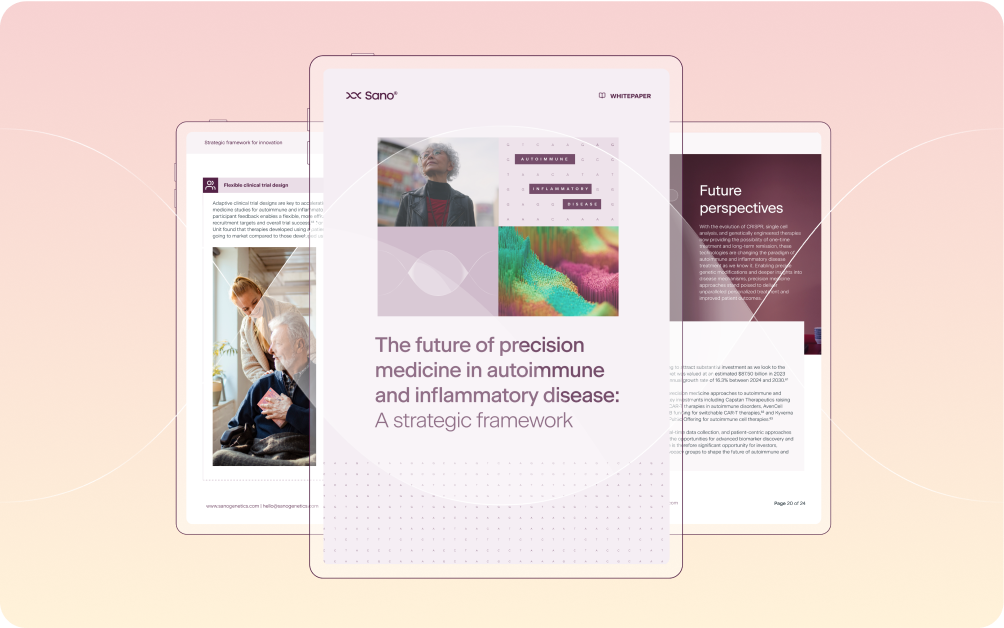The future of precision medicine in autoimmune and inflammatory disease: A strategic framework [whitepaper]

Despite growing momentum behind precision medicine, autoimmune and inflammatory diseases remain some of the most underserved areas in healthcare. Affecting an estimated 1 in 10 people globally, these conditions, from lupus and rheumatoid arthritis to Crohn’s disease and atopic dermatitis, are highly heterogeneous, notoriously complex, and often poorly understood at the molecular level.
Precision medicine promises to tailor treatments based on a patient’s genetic and molecular profile to minimize immune system disruption and improve long-term outcomes. But to realize that promise at scale, the field needs more than breakthrough science, it needs infrastructure, integration, and a strategic roadmap to guide the way forward.
In our latest whitepaper, "The future of precision medicine in autoimmune and inflammatory disease: A strategic framework," we outline how life science leaders can build the foundations to bring precision medicine to the forefront of autoimmune and inflammatory care.
A field on the brink of transformation
Autoimmune and inflammatory diseases have historically relied on broad-spectrum immunosuppressants, treatments that work well for some, but often come with major side effects and inconsistent efficacy. With the rise of precision technologies, from CRISPR and single-cell analysis to AI-powered biomarker discovery, we’re now closer than ever to delivering safer, targeted interventions that account for the unique biology of each patient.
We’re already starting to see real signs of progress. CAR-T cell therapies, originally developed for cancer, are now showing promise in treating autoimmune diseases like lupus. Meanwhile, targeted drugs like JAK inhibitors are becoming more widely used in inflammatory arthritis, offering new options for patients who haven’t responded to traditional treatments. And investors are taking notice. In 2024 alone, biotech companies working on next-generation autoimmune therapies raised more than $600 million in funding. But despite the momentum, there are still major hurdles to overcome.
But while precision medicine has made real strides forward in oncology and rare disease, its application in immune-mediated conditions has been slower, mostly because of the biological diversity of these diseases and the complexity of building integrated systems to support personalized care. Without addressing these systemic barriers, the risk is that precision treatments will remain siloed in research, unable to reach the patients who need them most.
A strategic framework for progress
To help move the field forward, this whitepaper outlines a strategic framework designed specifically for autoimmune and inflammatory disease. It covers seven key focus areas, each chosen for its potential for real-world impact:
- Integrated data ecosystems: Building platforms that combine clinical, genomic, proteomic, and environmental data to enable smarter research and more tailored care.
- Cross-disciplinary collaboration: From international research consortia to innovation hubs, shared expertise is critical to solving complex, multi-systemic diseases.
- Advanced regulatory engagement: Working closely with regulators to shape approval pathways that reflect the realities of new technologies and small patient subgroups.
- Health economics and outcomes research (HEOR): Using models like P-HEOR to quantify value across distinct patient populations and support equitable access.
- Flexible clinical trial design: Embracing adaptive and platform trials to increase trial efficiency, reduce cost, and prioritize patient-centric endpoints.
- Stakeholder engagement: Involving patient advocates, payers, and policymakers early to align on access, literacy, and data ethics.
- IP and data sharing strategy: Balancing open science and IP protection through tiered access models, collaborative licensing, and secure, interoperable frameworks.
Each of these components is supported by real-world case studies, practical examples, and actionable recommendations for biotech, pharma, and healthcare stakeholders.
A call for coordinated action
Precision medicine in autoimmunity has the potential to change countless lives, but realizing that potential will take more than scientific breakthroughs. It needs a unified strategy that brings together technologists, clinicians, researchers, and patients to design solutions that are both impactful and equitable.
By laying the groundwork for better data sharing, flexible trials, and cross-sector collaboration, the framework outlined in this whitepaper aims to accelerate the shift from broad immunosuppression to truly personalized care.
Download the full whitepaper now to find out how your organization can help shape the next chapter in autoimmune and inflammatory disease treatment.

